The acting boss Austrac Peter Clark
VerifiedAdded on 2022/08/20
|10
|2743
|25
AI Summary
Contribute Materials
Your contribution can guide someone’s learning journey. Share your
documents today.
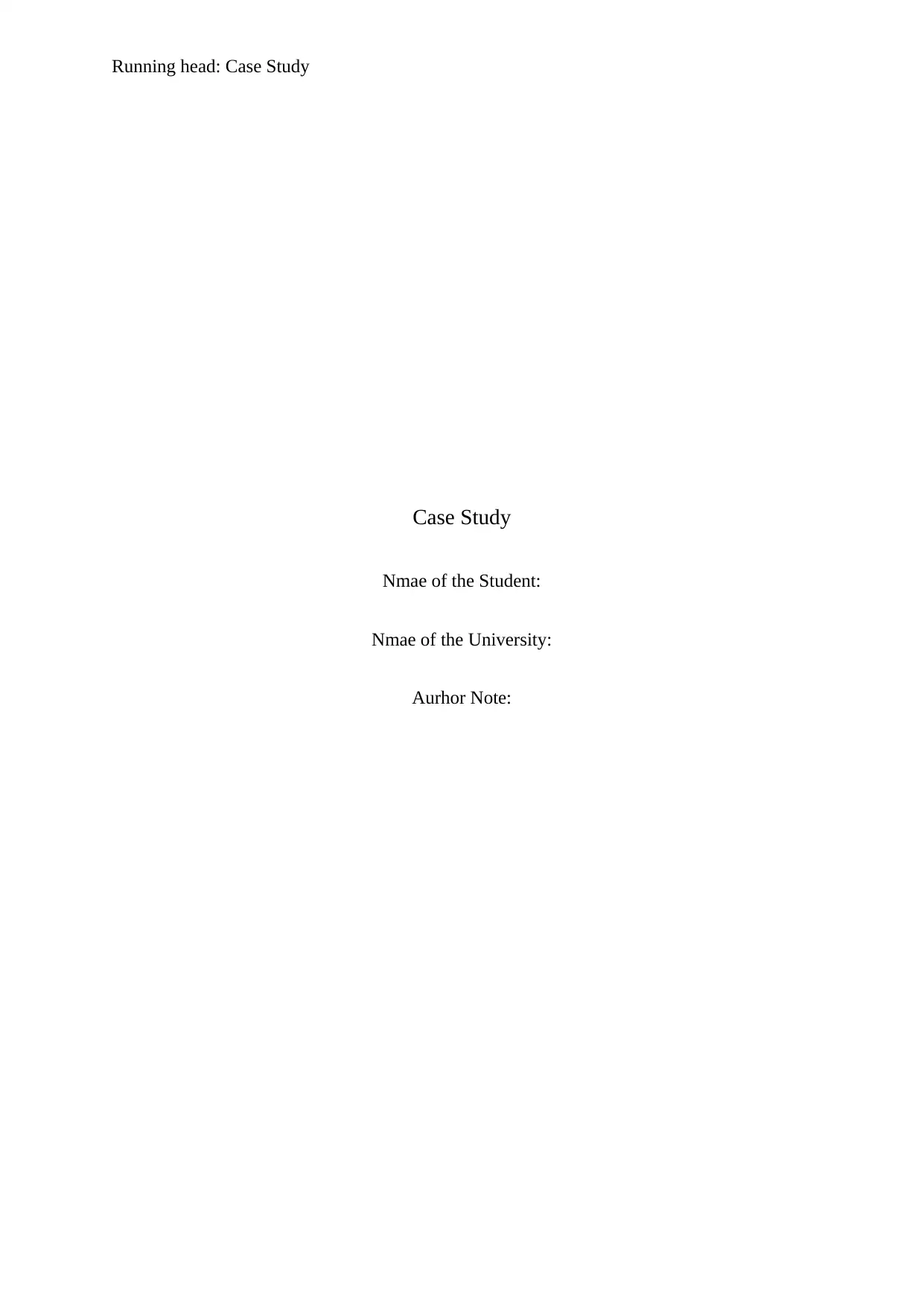
Running head: Case Study
Case Study
Nmae of the Student:
Nmae of the University:
Aurhor Note:
Case Study
Nmae of the Student:
Nmae of the University:
Aurhor Note:
Secure Best Marks with AI Grader
Need help grading? Try our AI Grader for instant feedback on your assignments.
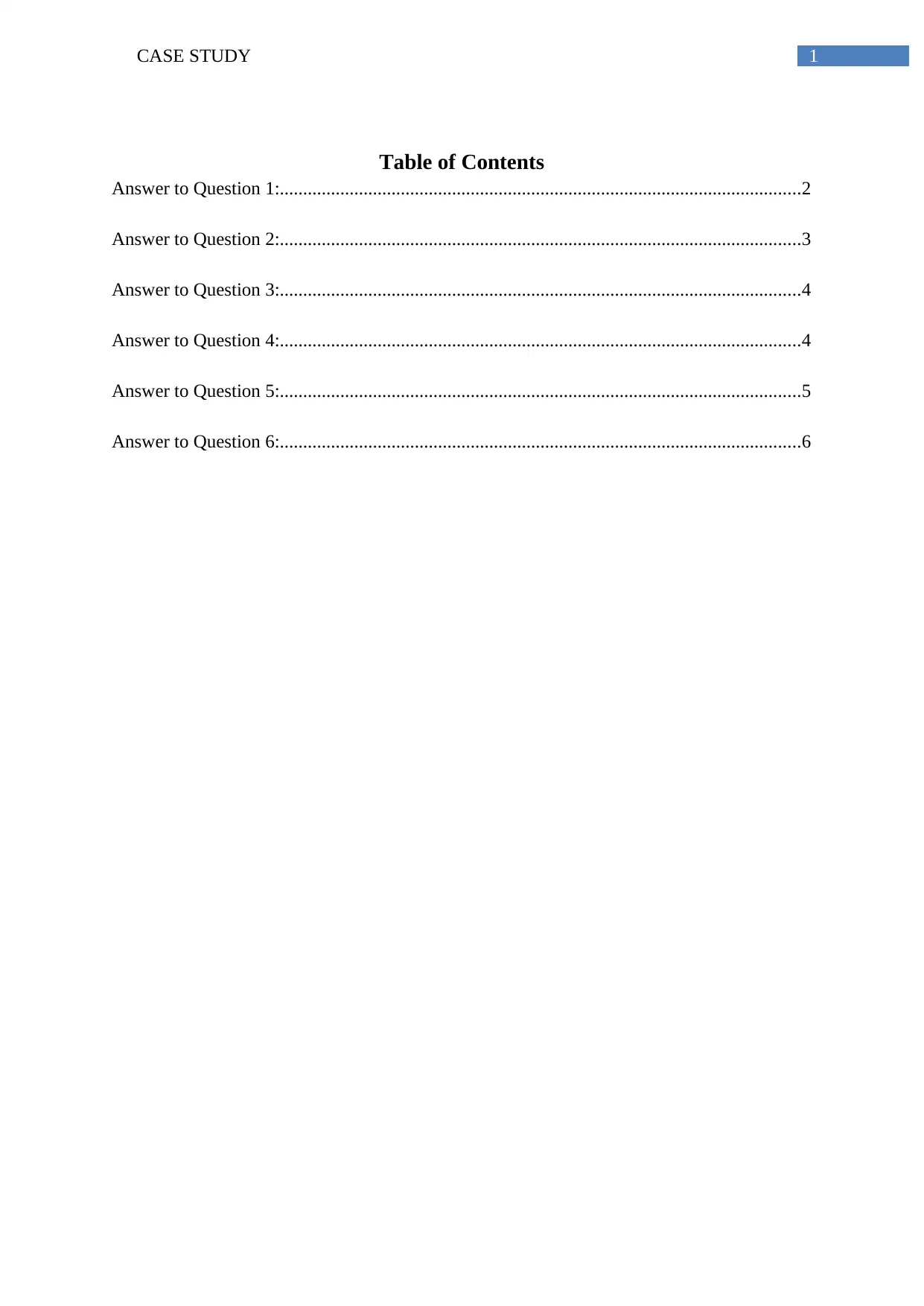
1CASE STUDY
Table of Contents
Answer to Question 1:................................................................................................................2
Answer to Question 2:................................................................................................................3
Answer to Question 3:................................................................................................................4
Answer to Question 4:................................................................................................................4
Answer to Question 5:................................................................................................................5
Answer to Question 6:................................................................................................................6
Table of Contents
Answer to Question 1:................................................................................................................2
Answer to Question 2:................................................................................................................3
Answer to Question 3:................................................................................................................4
Answer to Question 4:................................................................................................................4
Answer to Question 5:................................................................................................................5
Answer to Question 6:................................................................................................................6
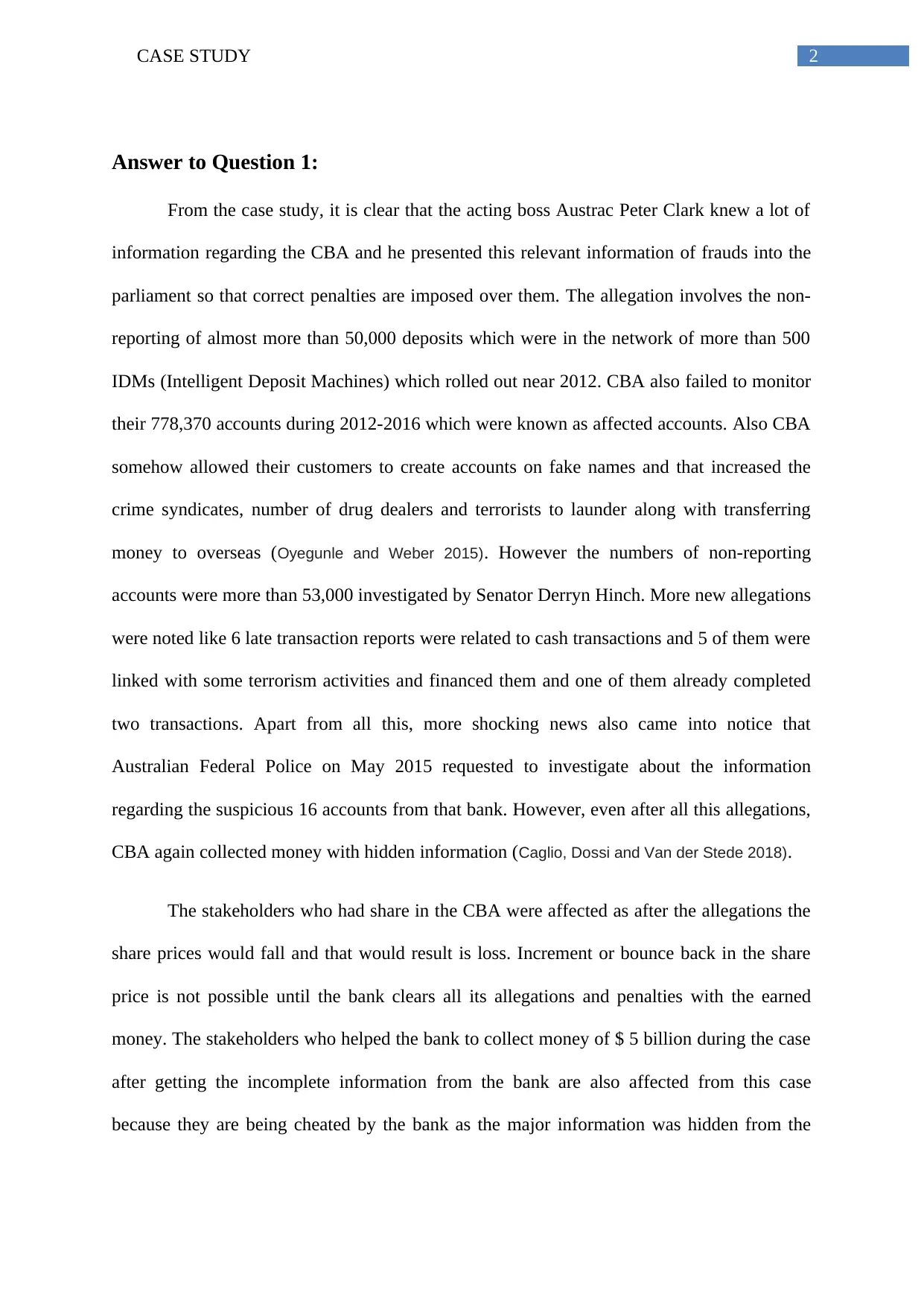
2CASE STUDY
Answer to Question 1:
From the case study, it is clear that the acting boss Austrac Peter Clark knew a lot of
information regarding the CBA and he presented this relevant information of frauds into the
parliament so that correct penalties are imposed over them. The allegation involves the non-
reporting of almost more than 50,000 deposits which were in the network of more than 500
IDMs (Intelligent Deposit Machines) which rolled out near 2012. CBA also failed to monitor
their 778,370 accounts during 2012-2016 which were known as affected accounts. Also CBA
somehow allowed their customers to create accounts on fake names and that increased the
crime syndicates, number of drug dealers and terrorists to launder along with transferring
money to overseas (Oyegunle and Weber 2015). However the numbers of non-reporting
accounts were more than 53,000 investigated by Senator Derryn Hinch. More new allegations
were noted like 6 late transaction reports were related to cash transactions and 5 of them were
linked with some terrorism activities and financed them and one of them already completed
two transactions. Apart from all this, more shocking news also came into notice that
Australian Federal Police on May 2015 requested to investigate about the information
regarding the suspicious 16 accounts from that bank. However, even after all this allegations,
CBA again collected money with hidden information (Caglio, Dossi and Van der Stede 2018).
The stakeholders who had share in the CBA were affected as after the allegations the
share prices would fall and that would result is loss. Increment or bounce back in the share
price is not possible until the bank clears all its allegations and penalties with the earned
money. The stakeholders who helped the bank to collect money of $ 5 billion during the case
after getting the incomplete information from the bank are also affected from this case
because they are being cheated by the bank as the major information was hidden from the
Answer to Question 1:
From the case study, it is clear that the acting boss Austrac Peter Clark knew a lot of
information regarding the CBA and he presented this relevant information of frauds into the
parliament so that correct penalties are imposed over them. The allegation involves the non-
reporting of almost more than 50,000 deposits which were in the network of more than 500
IDMs (Intelligent Deposit Machines) which rolled out near 2012. CBA also failed to monitor
their 778,370 accounts during 2012-2016 which were known as affected accounts. Also CBA
somehow allowed their customers to create accounts on fake names and that increased the
crime syndicates, number of drug dealers and terrorists to launder along with transferring
money to overseas (Oyegunle and Weber 2015). However the numbers of non-reporting
accounts were more than 53,000 investigated by Senator Derryn Hinch. More new allegations
were noted like 6 late transaction reports were related to cash transactions and 5 of them were
linked with some terrorism activities and financed them and one of them already completed
two transactions. Apart from all this, more shocking news also came into notice that
Australian Federal Police on May 2015 requested to investigate about the information
regarding the suspicious 16 accounts from that bank. However, even after all this allegations,
CBA again collected money with hidden information (Caglio, Dossi and Van der Stede 2018).
The stakeholders who had share in the CBA were affected as after the allegations the
share prices would fall and that would result is loss. Increment or bounce back in the share
price is not possible until the bank clears all its allegations and penalties with the earned
money. The stakeholders who helped the bank to collect money of $ 5 billion during the case
after getting the incomplete information from the bank are also affected from this case
because they are being cheated by the bank as the major information was hidden from the
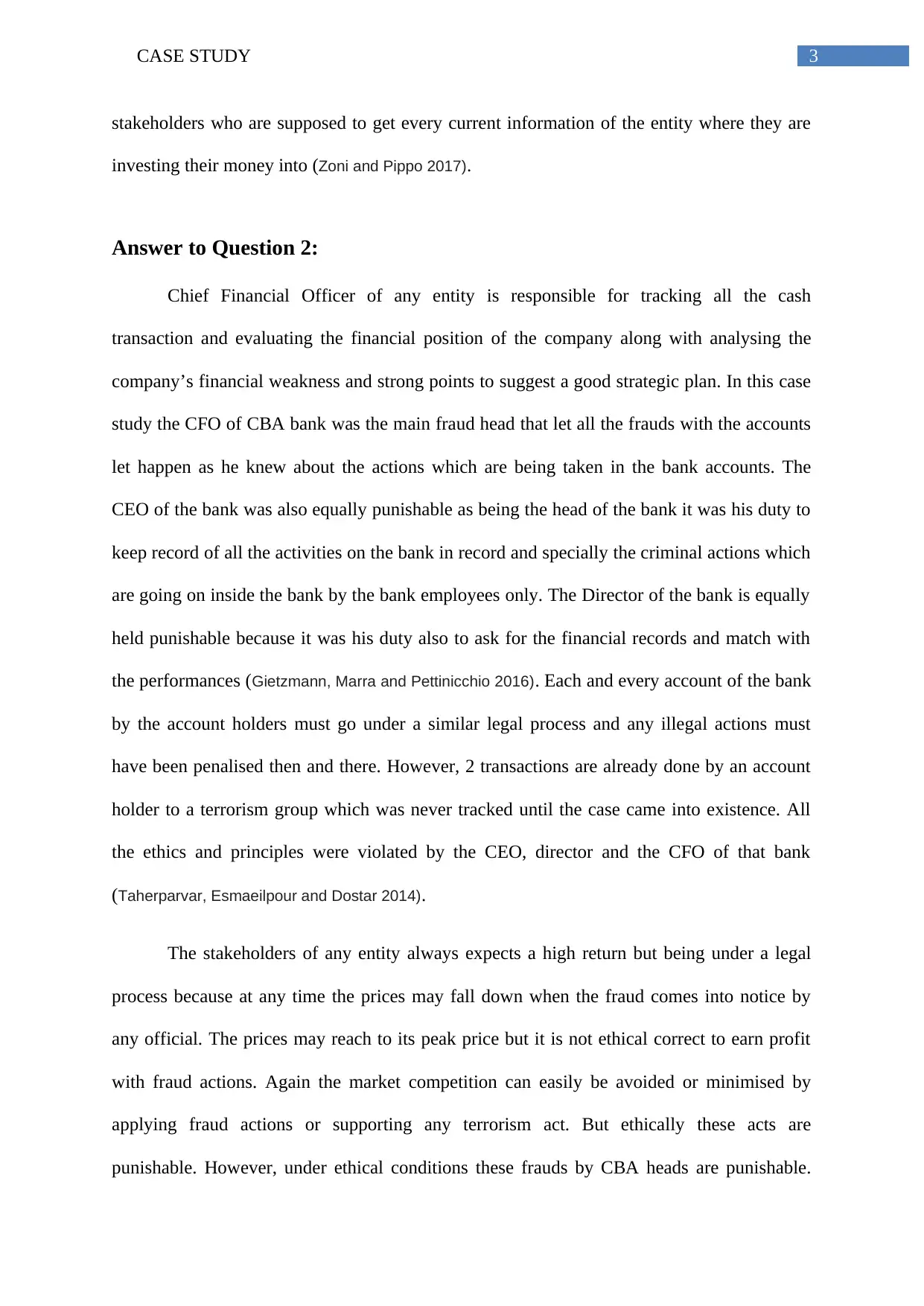
3CASE STUDY
stakeholders who are supposed to get every current information of the entity where they are
investing their money into (Zoni and Pippo 2017).
Answer to Question 2:
Chief Financial Officer of any entity is responsible for tracking all the cash
transaction and evaluating the financial position of the company along with analysing the
company’s financial weakness and strong points to suggest a good strategic plan. In this case
study the CFO of CBA bank was the main fraud head that let all the frauds with the accounts
let happen as he knew about the actions which are being taken in the bank accounts. The
CEO of the bank was also equally punishable as being the head of the bank it was his duty to
keep record of all the activities on the bank in record and specially the criminal actions which
are going on inside the bank by the bank employees only. The Director of the bank is equally
held punishable because it was his duty also to ask for the financial records and match with
the performances (Gietzmann, Marra and Pettinicchio 2016). Each and every account of the bank
by the account holders must go under a similar legal process and any illegal actions must
have been penalised then and there. However, 2 transactions are already done by an account
holder to a terrorism group which was never tracked until the case came into existence. All
the ethics and principles were violated by the CEO, director and the CFO of that bank
(Taherparvar, Esmaeilpour and Dostar 2014).
The stakeholders of any entity always expects a high return but being under a legal
process because at any time the prices may fall down when the fraud comes into notice by
any official. The prices may reach to its peak price but it is not ethical correct to earn profit
with fraud actions. Again the market competition can easily be avoided or minimised by
applying fraud actions or supporting any terrorism act. But ethically these acts are
punishable. However, under ethical conditions these frauds by CBA heads are punishable.
stakeholders who are supposed to get every current information of the entity where they are
investing their money into (Zoni and Pippo 2017).
Answer to Question 2:
Chief Financial Officer of any entity is responsible for tracking all the cash
transaction and evaluating the financial position of the company along with analysing the
company’s financial weakness and strong points to suggest a good strategic plan. In this case
study the CFO of CBA bank was the main fraud head that let all the frauds with the accounts
let happen as he knew about the actions which are being taken in the bank accounts. The
CEO of the bank was also equally punishable as being the head of the bank it was his duty to
keep record of all the activities on the bank in record and specially the criminal actions which
are going on inside the bank by the bank employees only. The Director of the bank is equally
held punishable because it was his duty also to ask for the financial records and match with
the performances (Gietzmann, Marra and Pettinicchio 2016). Each and every account of the bank
by the account holders must go under a similar legal process and any illegal actions must
have been penalised then and there. However, 2 transactions are already done by an account
holder to a terrorism group which was never tracked until the case came into existence. All
the ethics and principles were violated by the CEO, director and the CFO of that bank
(Taherparvar, Esmaeilpour and Dostar 2014).
The stakeholders of any entity always expects a high return but being under a legal
process because at any time the prices may fall down when the fraud comes into notice by
any official. The prices may reach to its peak price but it is not ethical correct to earn profit
with fraud actions. Again the market competition can easily be avoided or minimised by
applying fraud actions or supporting any terrorism act. But ethically these acts are
punishable. However, under ethical conditions these frauds by CBA heads are punishable.
Secure Best Marks with AI Grader
Need help grading? Try our AI Grader for instant feedback on your assignments.
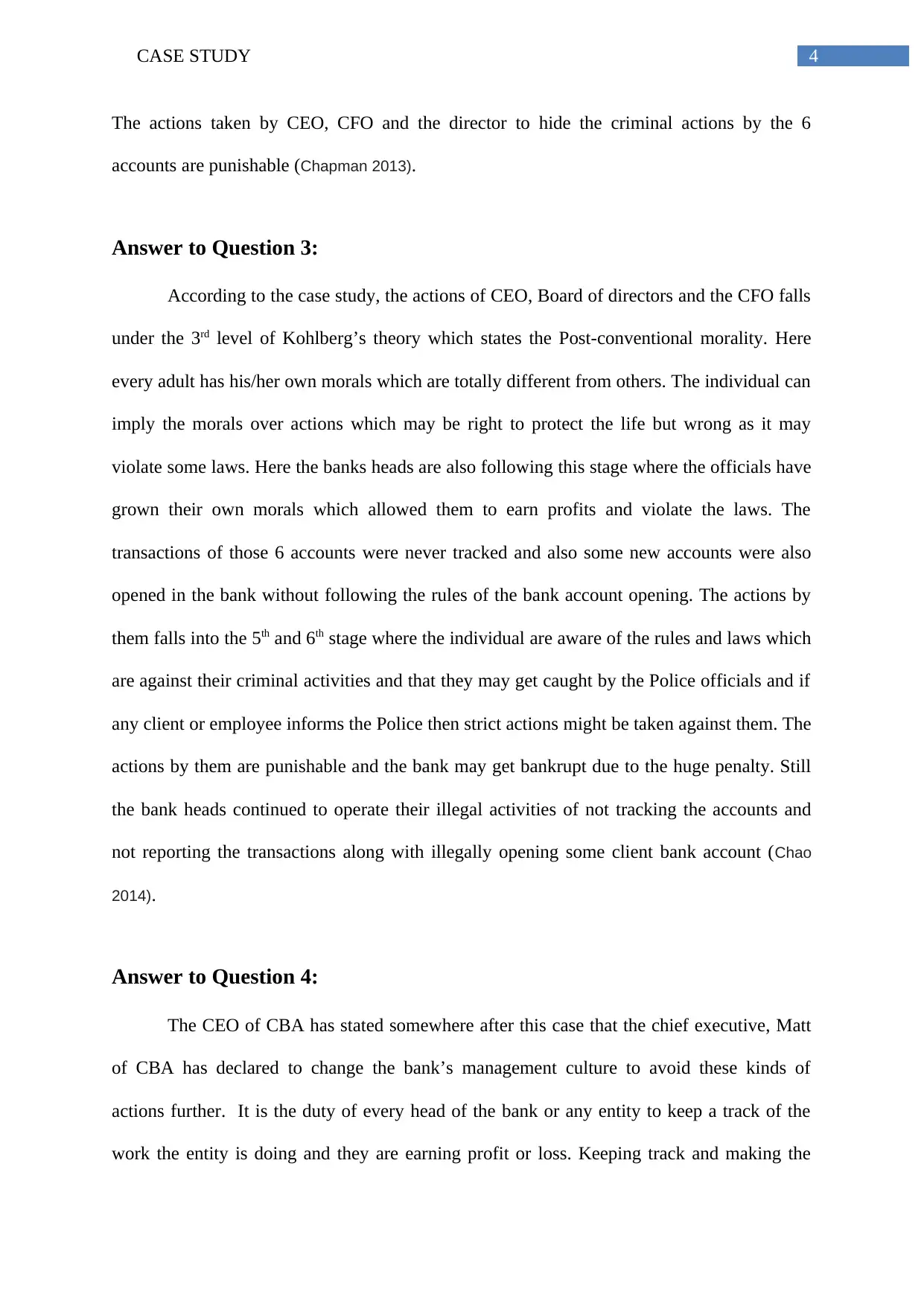
4CASE STUDY
The actions taken by CEO, CFO and the director to hide the criminal actions by the 6
accounts are punishable (Chapman 2013).
Answer to Question 3:
According to the case study, the actions of CEO, Board of directors and the CFO falls
under the 3rd level of Kohlberg’s theory which states the Post-conventional morality. Here
every adult has his/her own morals which are totally different from others. The individual can
imply the morals over actions which may be right to protect the life but wrong as it may
violate some laws. Here the banks heads are also following this stage where the officials have
grown their own morals which allowed them to earn profits and violate the laws. The
transactions of those 6 accounts were never tracked and also some new accounts were also
opened in the bank without following the rules of the bank account opening. The actions by
them falls into the 5th and 6th stage where the individual are aware of the rules and laws which
are against their criminal activities and that they may get caught by the Police officials and if
any client or employee informs the Police then strict actions might be taken against them. The
actions by them are punishable and the bank may get bankrupt due to the huge penalty. Still
the bank heads continued to operate their illegal activities of not tracking the accounts and
not reporting the transactions along with illegally opening some client bank account (Chao
2014).
Answer to Question 4:
The CEO of CBA has stated somewhere after this case that the chief executive, Matt
of CBA has declared to change the bank’s management culture to avoid these kinds of
actions further. It is the duty of every head of the bank or any entity to keep a track of the
work the entity is doing and they are earning profit or loss. Keeping track and making the
The actions taken by CEO, CFO and the director to hide the criminal actions by the 6
accounts are punishable (Chapman 2013).
Answer to Question 3:
According to the case study, the actions of CEO, Board of directors and the CFO falls
under the 3rd level of Kohlberg’s theory which states the Post-conventional morality. Here
every adult has his/her own morals which are totally different from others. The individual can
imply the morals over actions which may be right to protect the life but wrong as it may
violate some laws. Here the banks heads are also following this stage where the officials have
grown their own morals which allowed them to earn profits and violate the laws. The
transactions of those 6 accounts were never tracked and also some new accounts were also
opened in the bank without following the rules of the bank account opening. The actions by
them falls into the 5th and 6th stage where the individual are aware of the rules and laws which
are against their criminal activities and that they may get caught by the Police officials and if
any client or employee informs the Police then strict actions might be taken against them. The
actions by them are punishable and the bank may get bankrupt due to the huge penalty. Still
the bank heads continued to operate their illegal activities of not tracking the accounts and
not reporting the transactions along with illegally opening some client bank account (Chao
2014).
Answer to Question 4:
The CEO of CBA has stated somewhere after this case that the chief executive, Matt
of CBA has declared to change the bank’s management culture to avoid these kinds of
actions further. It is the duty of every head of the bank or any entity to keep a track of the
work the entity is doing and they are earning profit or loss. Keeping track and making the
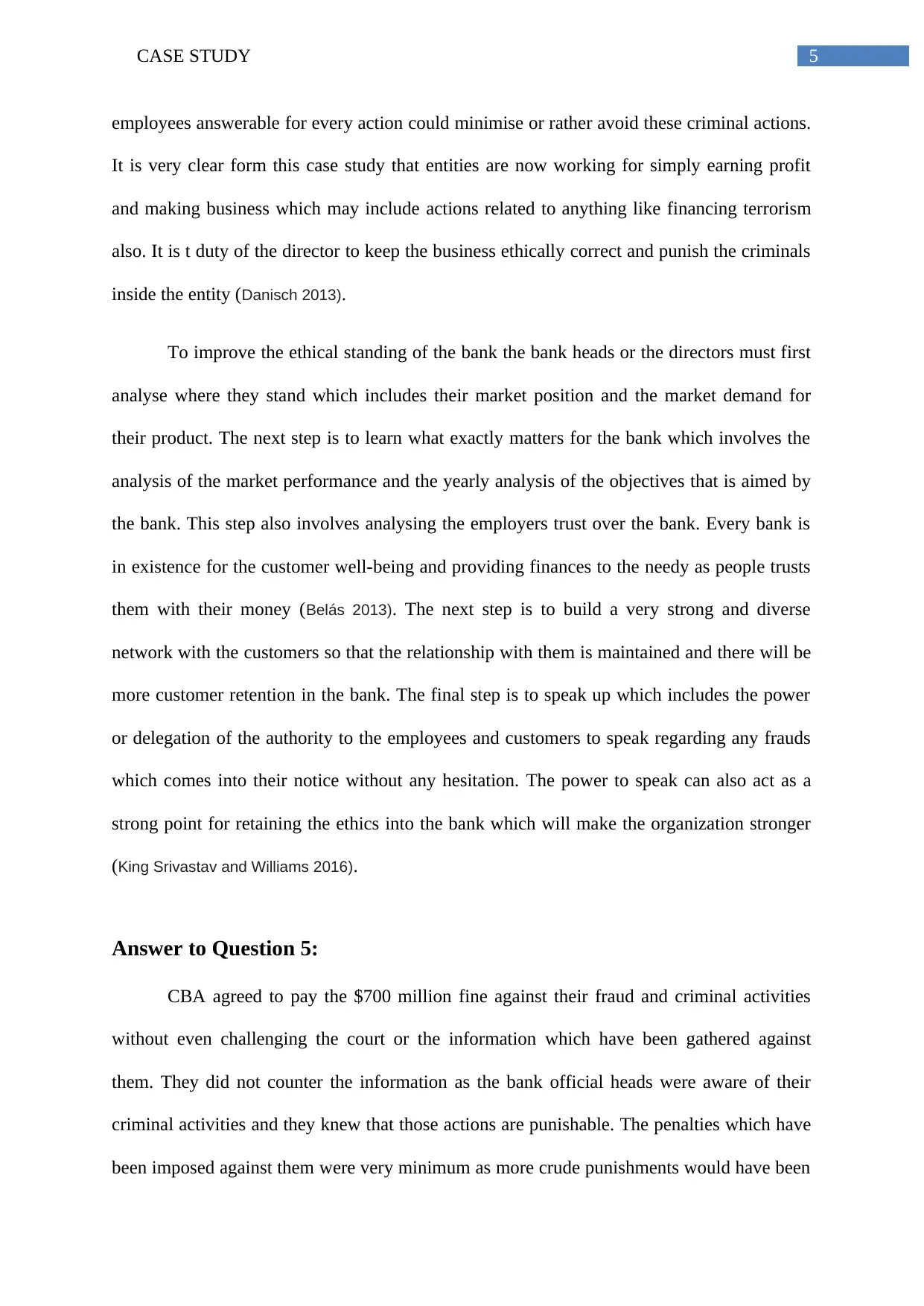
5CASE STUDY
employees answerable for every action could minimise or rather avoid these criminal actions.
It is very clear form this case study that entities are now working for simply earning profit
and making business which may include actions related to anything like financing terrorism
also. It is t duty of the director to keep the business ethically correct and punish the criminals
inside the entity (Danisch 2013).
To improve the ethical standing of the bank the bank heads or the directors must first
analyse where they stand which includes their market position and the market demand for
their product. The next step is to learn what exactly matters for the bank which involves the
analysis of the market performance and the yearly analysis of the objectives that is aimed by
the bank. This step also involves analysing the employers trust over the bank. Every bank is
in existence for the customer well-being and providing finances to the needy as people trusts
them with their money (Belás 2013). The next step is to build a very strong and diverse
network with the customers so that the relationship with them is maintained and there will be
more customer retention in the bank. The final step is to speak up which includes the power
or delegation of the authority to the employees and customers to speak regarding any frauds
which comes into their notice without any hesitation. The power to speak can also act as a
strong point for retaining the ethics into the bank which will make the organization stronger
(King Srivastav and Williams 2016).
Answer to Question 5:
CBA agreed to pay the $700 million fine against their fraud and criminal activities
without even challenging the court or the information which have been gathered against
them. They did not counter the information as the bank official heads were aware of their
criminal activities and they knew that those actions are punishable. The penalties which have
been imposed against them were very minimum as more crude punishments would have been
employees answerable for every action could minimise or rather avoid these criminal actions.
It is very clear form this case study that entities are now working for simply earning profit
and making business which may include actions related to anything like financing terrorism
also. It is t duty of the director to keep the business ethically correct and punish the criminals
inside the entity (Danisch 2013).
To improve the ethical standing of the bank the bank heads or the directors must first
analyse where they stand which includes their market position and the market demand for
their product. The next step is to learn what exactly matters for the bank which involves the
analysis of the market performance and the yearly analysis of the objectives that is aimed by
the bank. This step also involves analysing the employers trust over the bank. Every bank is
in existence for the customer well-being and providing finances to the needy as people trusts
them with their money (Belás 2013). The next step is to build a very strong and diverse
network with the customers so that the relationship with them is maintained and there will be
more customer retention in the bank. The final step is to speak up which includes the power
or delegation of the authority to the employees and customers to speak regarding any frauds
which comes into their notice without any hesitation. The power to speak can also act as a
strong point for retaining the ethics into the bank which will make the organization stronger
(King Srivastav and Williams 2016).
Answer to Question 5:
CBA agreed to pay the $700 million fine against their fraud and criminal activities
without even challenging the court or the information which have been gathered against
them. They did not counter the information as the bank official heads were aware of their
criminal activities and they knew that those actions are punishable. The penalties which have
been imposed against them were very minimum as more crude punishments would have been
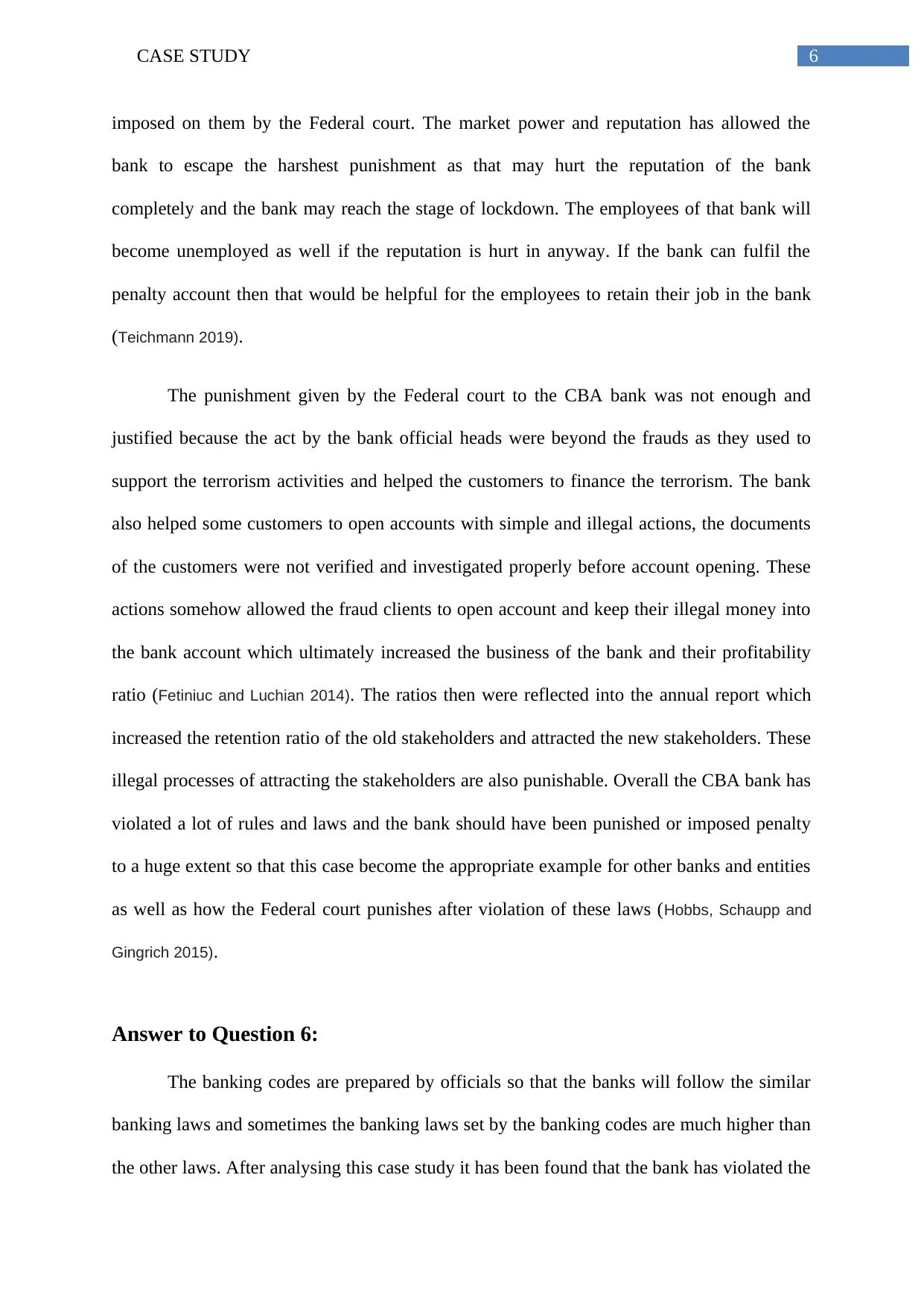
6CASE STUDY
imposed on them by the Federal court. The market power and reputation has allowed the
bank to escape the harshest punishment as that may hurt the reputation of the bank
completely and the bank may reach the stage of lockdown. The employees of that bank will
become unemployed as well if the reputation is hurt in anyway. If the bank can fulfil the
penalty account then that would be helpful for the employees to retain their job in the bank
(Teichmann 2019).
The punishment given by the Federal court to the CBA bank was not enough and
justified because the act by the bank official heads were beyond the frauds as they used to
support the terrorism activities and helped the customers to finance the terrorism. The bank
also helped some customers to open accounts with simple and illegal actions, the documents
of the customers were not verified and investigated properly before account opening. These
actions somehow allowed the fraud clients to open account and keep their illegal money into
the bank account which ultimately increased the business of the bank and their profitability
ratio (Fetiniuc and Luchian 2014). The ratios then were reflected into the annual report which
increased the retention ratio of the old stakeholders and attracted the new stakeholders. These
illegal processes of attracting the stakeholders are also punishable. Overall the CBA bank has
violated a lot of rules and laws and the bank should have been punished or imposed penalty
to a huge extent so that this case become the appropriate example for other banks and entities
as well as how the Federal court punishes after violation of these laws (Hobbs, Schaupp and
Gingrich 2015).
Answer to Question 6:
The banking codes are prepared by officials so that the banks will follow the similar
banking laws and sometimes the banking laws set by the banking codes are much higher than
the other laws. After analysing this case study it has been found that the bank has violated the
imposed on them by the Federal court. The market power and reputation has allowed the
bank to escape the harshest punishment as that may hurt the reputation of the bank
completely and the bank may reach the stage of lockdown. The employees of that bank will
become unemployed as well if the reputation is hurt in anyway. If the bank can fulfil the
penalty account then that would be helpful for the employees to retain their job in the bank
(Teichmann 2019).
The punishment given by the Federal court to the CBA bank was not enough and
justified because the act by the bank official heads were beyond the frauds as they used to
support the terrorism activities and helped the customers to finance the terrorism. The bank
also helped some customers to open accounts with simple and illegal actions, the documents
of the customers were not verified and investigated properly before account opening. These
actions somehow allowed the fraud clients to open account and keep their illegal money into
the bank account which ultimately increased the business of the bank and their profitability
ratio (Fetiniuc and Luchian 2014). The ratios then were reflected into the annual report which
increased the retention ratio of the old stakeholders and attracted the new stakeholders. These
illegal processes of attracting the stakeholders are also punishable. Overall the CBA bank has
violated a lot of rules and laws and the bank should have been punished or imposed penalty
to a huge extent so that this case become the appropriate example for other banks and entities
as well as how the Federal court punishes after violation of these laws (Hobbs, Schaupp and
Gingrich 2015).
Answer to Question 6:
The banking codes are prepared by officials so that the banks will follow the similar
banking laws and sometimes the banking laws set by the banking codes are much higher than
the other laws. After analysing this case study it has been found that the bank has violated the
Paraphrase This Document
Need a fresh take? Get an instant paraphrase of this document with our AI Paraphraser
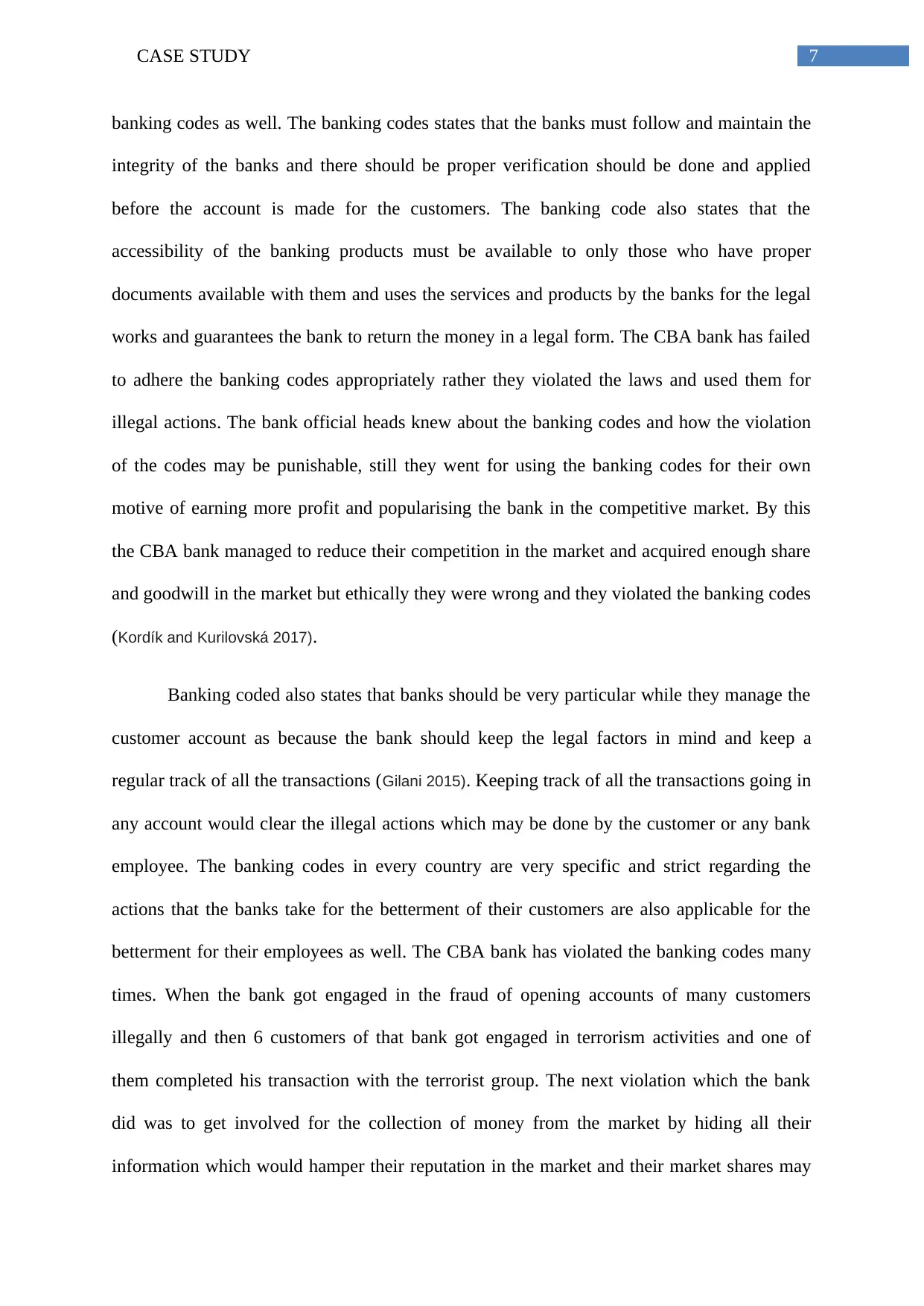
7CASE STUDY
banking codes as well. The banking codes states that the banks must follow and maintain the
integrity of the banks and there should be proper verification should be done and applied
before the account is made for the customers. The banking code also states that the
accessibility of the banking products must be available to only those who have proper
documents available with them and uses the services and products by the banks for the legal
works and guarantees the bank to return the money in a legal form. The CBA bank has failed
to adhere the banking codes appropriately rather they violated the laws and used them for
illegal actions. The bank official heads knew about the banking codes and how the violation
of the codes may be punishable, still they went for using the banking codes for their own
motive of earning more profit and popularising the bank in the competitive market. By this
the CBA bank managed to reduce their competition in the market and acquired enough share
and goodwill in the market but ethically they were wrong and they violated the banking codes
(Kordík and Kurilovská 2017).
Banking coded also states that banks should be very particular while they manage the
customer account as because the bank should keep the legal factors in mind and keep a
regular track of all the transactions (Gilani 2015). Keeping track of all the transactions going in
any account would clear the illegal actions which may be done by the customer or any bank
employee. The banking codes in every country are very specific and strict regarding the
actions that the banks take for the betterment of their customers are also applicable for the
betterment for their employees as well. The CBA bank has violated the banking codes many
times. When the bank got engaged in the fraud of opening accounts of many customers
illegally and then 6 customers of that bank got engaged in terrorism activities and one of
them completed his transaction with the terrorist group. The next violation which the bank
did was to get involved for the collection of money from the market by hiding all their
information which would hamper their reputation in the market and their market shares may
banking codes as well. The banking codes states that the banks must follow and maintain the
integrity of the banks and there should be proper verification should be done and applied
before the account is made for the customers. The banking code also states that the
accessibility of the banking products must be available to only those who have proper
documents available with them and uses the services and products by the banks for the legal
works and guarantees the bank to return the money in a legal form. The CBA bank has failed
to adhere the banking codes appropriately rather they violated the laws and used them for
illegal actions. The bank official heads knew about the banking codes and how the violation
of the codes may be punishable, still they went for using the banking codes for their own
motive of earning more profit and popularising the bank in the competitive market. By this
the CBA bank managed to reduce their competition in the market and acquired enough share
and goodwill in the market but ethically they were wrong and they violated the banking codes
(Kordík and Kurilovská 2017).
Banking coded also states that banks should be very particular while they manage the
customer account as because the bank should keep the legal factors in mind and keep a
regular track of all the transactions (Gilani 2015). Keeping track of all the transactions going in
any account would clear the illegal actions which may be done by the customer or any bank
employee. The banking codes in every country are very specific and strict regarding the
actions that the banks take for the betterment of their customers are also applicable for the
betterment for their employees as well. The CBA bank has violated the banking codes many
times. When the bank got engaged in the fraud of opening accounts of many customers
illegally and then 6 customers of that bank got engaged in terrorism activities and one of
them completed his transaction with the terrorist group. The next violation which the bank
did was to get involved for the collection of money from the market by hiding all their
information which would hamper their reputation in the market and their market shares may
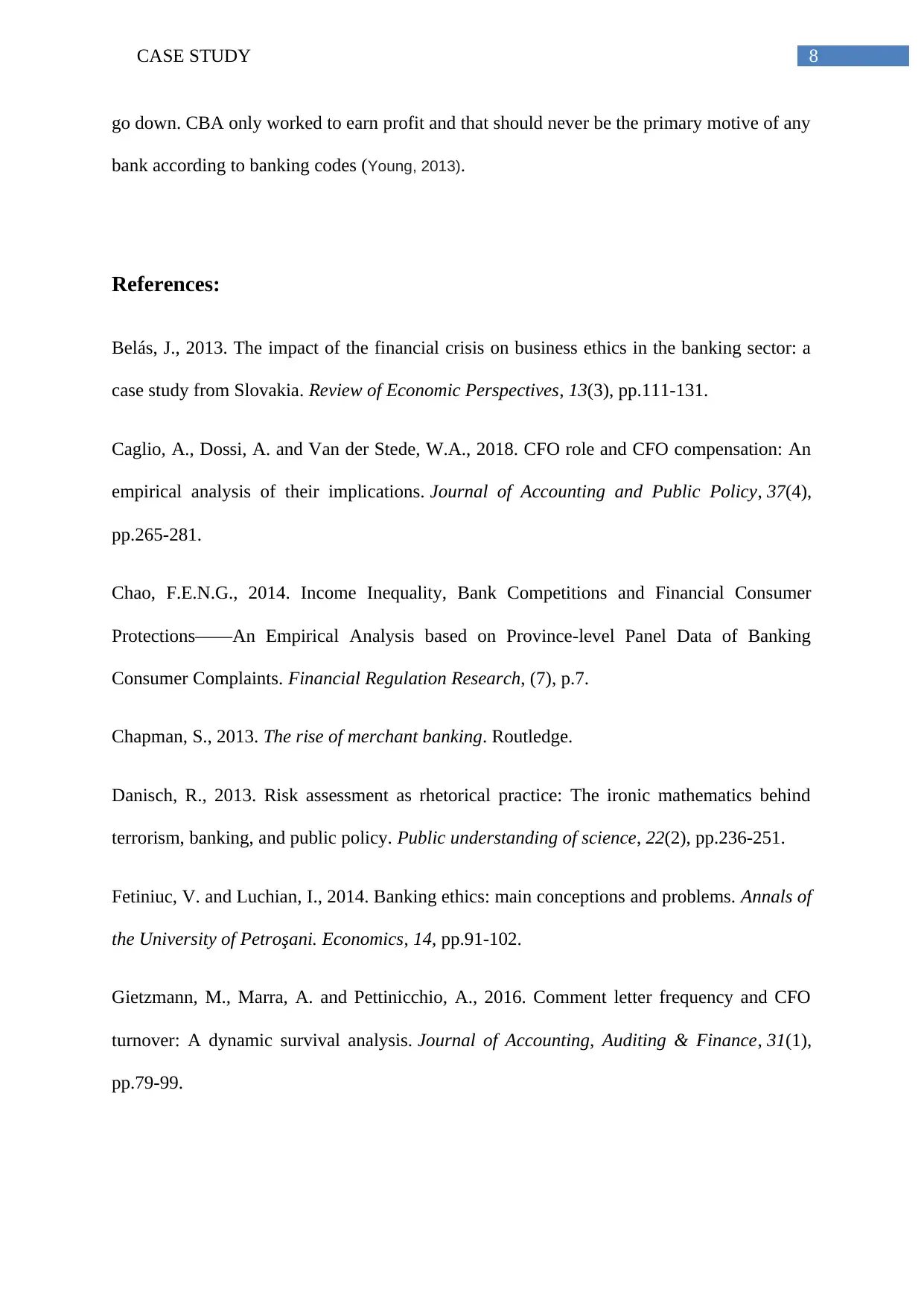
8CASE STUDY
go down. CBA only worked to earn profit and that should never be the primary motive of any
bank according to banking codes (Young, 2013).
References:
Belás, J., 2013. The impact of the financial crisis on business ethics in the banking sector: a
case study from Slovakia. Review of Economic Perspectives, 13(3), pp.111-131.
Caglio, A., Dossi, A. and Van der Stede, W.A., 2018. CFO role and CFO compensation: An
empirical analysis of their implications. Journal of Accounting and Public Policy, 37(4),
pp.265-281.
Chao, F.E.N.G., 2014. Income Inequality, Bank Competitions and Financial Consumer
Protections——An Empirical Analysis based on Province-level Panel Data of Banking
Consumer Complaints. Financial Regulation Research, (7), p.7.
Chapman, S., 2013. The rise of merchant banking. Routledge.
Danisch, R., 2013. Risk assessment as rhetorical practice: The ironic mathematics behind
terrorism, banking, and public policy. Public understanding of science, 22(2), pp.236-251.
Fetiniuc, V. and Luchian, I., 2014. Banking ethics: main conceptions and problems. Annals of
the University of Petroşani. Economics , 14, pp.91-102.
Gietzmann, M., Marra, A. and Pettinicchio, A., 2016. Comment letter frequency and CFO
turnover: A dynamic survival analysis. Journal of Accounting, Auditing & Finance, 31(1),
pp.79-99.
go down. CBA only worked to earn profit and that should never be the primary motive of any
bank according to banking codes (Young, 2013).
References:
Belás, J., 2013. The impact of the financial crisis on business ethics in the banking sector: a
case study from Slovakia. Review of Economic Perspectives, 13(3), pp.111-131.
Caglio, A., Dossi, A. and Van der Stede, W.A., 2018. CFO role and CFO compensation: An
empirical analysis of their implications. Journal of Accounting and Public Policy, 37(4),
pp.265-281.
Chao, F.E.N.G., 2014. Income Inequality, Bank Competitions and Financial Consumer
Protections——An Empirical Analysis based on Province-level Panel Data of Banking
Consumer Complaints. Financial Regulation Research, (7), p.7.
Chapman, S., 2013. The rise of merchant banking. Routledge.
Danisch, R., 2013. Risk assessment as rhetorical practice: The ironic mathematics behind
terrorism, banking, and public policy. Public understanding of science, 22(2), pp.236-251.
Fetiniuc, V. and Luchian, I., 2014. Banking ethics: main conceptions and problems. Annals of
the University of Petroşani. Economics , 14, pp.91-102.
Gietzmann, M., Marra, A. and Pettinicchio, A., 2016. Comment letter frequency and CFO
turnover: A dynamic survival analysis. Journal of Accounting, Auditing & Finance, 31(1),
pp.79-99.
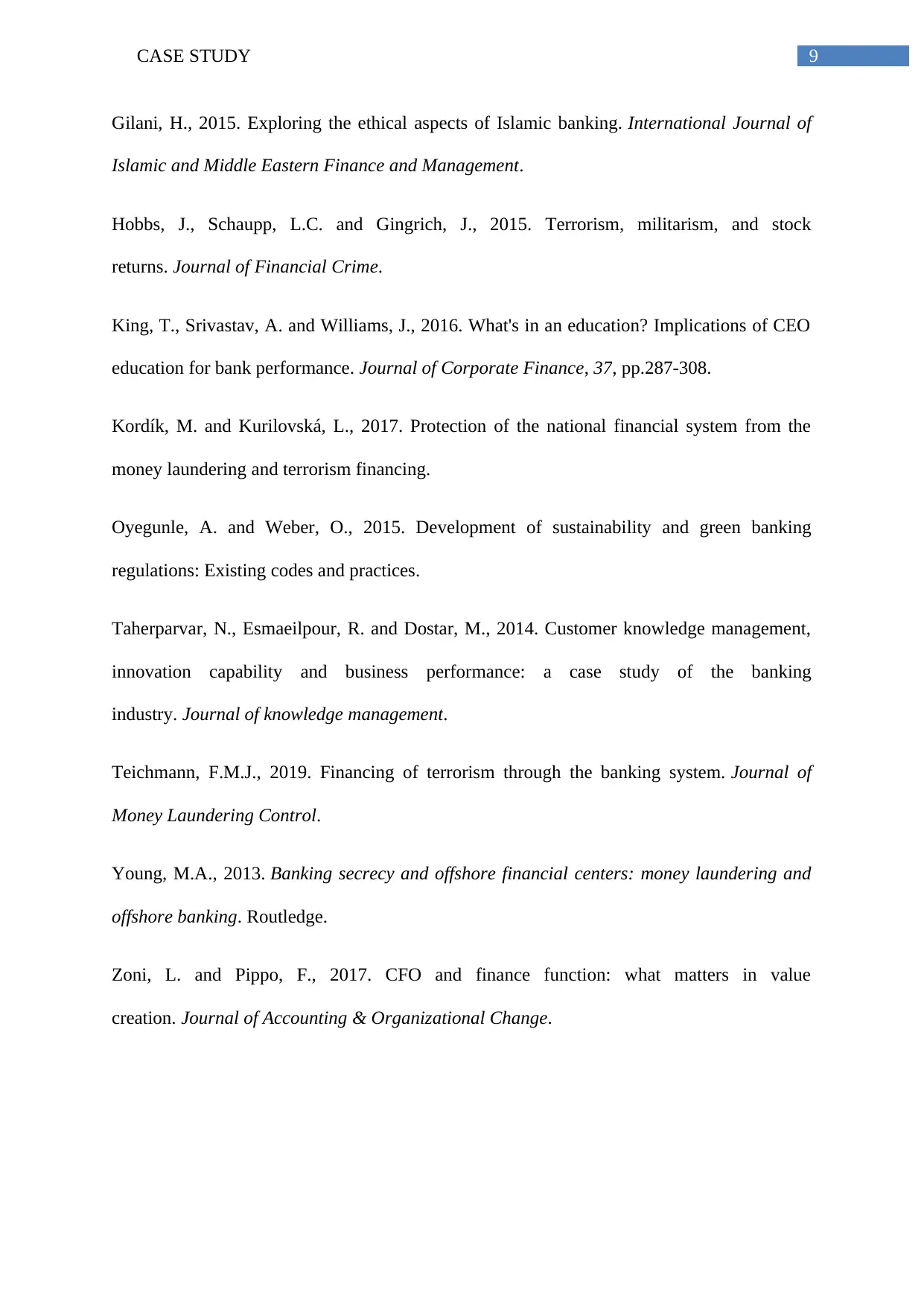
9CASE STUDY
Gilani, H., 2015. Exploring the ethical aspects of Islamic banking. International Journal of
Islamic and Middle Eastern Finance and Management.
Hobbs, J., Schaupp, L.C. and Gingrich, J., 2015. Terrorism, militarism, and stock
returns. Journal of Financial Crime.
King, T., Srivastav, A. and Williams, J., 2016. What's in an education? Implications of CEO
education for bank performance. Journal of Corporate Finance, 37, pp.287-308.
Kordík, M. and Kurilovská, L., 2017. Protection of the national financial system from the
money laundering and terrorism financing.
Oyegunle, A. and Weber, O., 2015. Development of sustainability and green banking
regulations: Existing codes and practices.
Taherparvar, N., Esmaeilpour, R. and Dostar, M., 2014. Customer knowledge management,
innovation capability and business performance: a case study of the banking
industry. Journal of knowledge management.
Teichmann, F.M.J., 2019. Financing of terrorism through the banking system. Journal of
Money Laundering Control.
Young, M.A., 2013. Banking secrecy and offshore financial centers: money laundering and
offshore banking. Routledge.
Zoni, L. and Pippo, F., 2017. CFO and finance function: what matters in value
creation. Journal of Accounting & Organizational Change.
Gilani, H., 2015. Exploring the ethical aspects of Islamic banking. International Journal of
Islamic and Middle Eastern Finance and Management.
Hobbs, J., Schaupp, L.C. and Gingrich, J., 2015. Terrorism, militarism, and stock
returns. Journal of Financial Crime.
King, T., Srivastav, A. and Williams, J., 2016. What's in an education? Implications of CEO
education for bank performance. Journal of Corporate Finance, 37, pp.287-308.
Kordík, M. and Kurilovská, L., 2017. Protection of the national financial system from the
money laundering and terrorism financing.
Oyegunle, A. and Weber, O., 2015. Development of sustainability and green banking
regulations: Existing codes and practices.
Taherparvar, N., Esmaeilpour, R. and Dostar, M., 2014. Customer knowledge management,
innovation capability and business performance: a case study of the banking
industry. Journal of knowledge management.
Teichmann, F.M.J., 2019. Financing of terrorism through the banking system. Journal of
Money Laundering Control.
Young, M.A., 2013. Banking secrecy and offshore financial centers: money laundering and
offshore banking. Routledge.
Zoni, L. and Pippo, F., 2017. CFO and finance function: what matters in value
creation. Journal of Accounting & Organizational Change.
1 out of 10
Related Documents
Your All-in-One AI-Powered Toolkit for Academic Success.
+13062052269
info@desklib.com
Available 24*7 on WhatsApp / Email
![[object Object]](/_next/static/media/star-bottom.7253800d.svg)
Unlock your academic potential
© 2024 | Zucol Services PVT LTD | All rights reserved.




